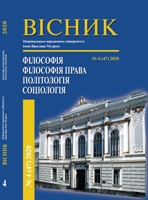ПЕРЕТВОРЕННЯ ПРАВА: ПОГЛЯД З ПОЗИЦІЇ КОМУНІКАТИВНОЇ ТЕОРІЇ
TRANSFORMATION OF LAW: A VIEW FROM THE STANDPOINT OF COMMUNICATIVE THEORY
Author(s): Bjarne MelkevikSubject(s): Political Philosophy, Pragmatism, Philosophy of Law
Published by: Національний юридичний університет імені Ярослава Мудрого
Keywords: Jürgen Habermas; Habermas and Law; communicative theory; legal philosophy; law and legal transformation;
Summary/Abstract: Problem setting. The author examines the theory of communicative action developed by the German philosopher Jürgen Habermas and analyses its relevance for legal thinking. He claims that the theory of communicative action can be both fruitful for understanding the legal phenomena in modern pluralistic societies and for explaining and justifying legal transformations and legal changes.Recent research and publication analysis. The study of the above-mentioned problem is carried out at metatheoretic level in consideration of the author's arguments about the theoretical model for understanding legal transformations and the impossibility of a theory of a descriptive nature. This study is based on a broad philosophical and legal argumentation in order to present the communicative model as a high-yielding and open model of legal thought.Paper’s objective: The author finds it appropriate to outline the main lines of Habermas’s views about social transformation and communication and to take into account the conclusions that can be drawn from them in the realm of legal philosophy, legal theory and legal thinking in general. One of the aims of this paper is to draw attention to the works of the philosopher Jurgen Habermas and to the importance of establishing a wide social and argumentative dialogue as well as an “argumentative culture”. Paper’s main body. The author proceeds from the fact that Habermas's theory, based on the theory of communicative action, or simply the communicative model, can be beneficial for the investigation of how we think about legal transformation and changes in the legal domain. In this regard the author analyses and investigates the needs of modern pluralistic societies to theoretically explain and justify legal transformations. Based on these goals, the article explores the implementation of legal transformations on a rational basis.The author's aim is focused on the analysis of law in modern societies in the form perceived theoretically by Habermas. The article shows that Habermas has a two-sided concept of law, which allows him to accurately articulate the problem of law transformation. The theoretical problem is approched by analysing the formation of law based on legal texts that have received social meta-significance.Conclusions of the research. Habermas's emphasis on the importance of the life-world teaches us that the rules of action regulated by legal prescriptions are not transformed arbitrarily, solely by "free will". With this understanding, law is a project of "living together", reproduced from the common foundation of the life-world. This should inspire legal scholars to understand the law in a way that inspire caution when assessing the observance of tradition in the perspective of cultural renewal.
Journal: Вісник НЮУ імені Ярослава Мудрого. Серія: Філософія, філософія права, політологія, соціологія
- Issue Year: 47/2020
- Issue No: 4
- Page Range: 35-46
- Page Count: 12
- Language: Ukrainian

